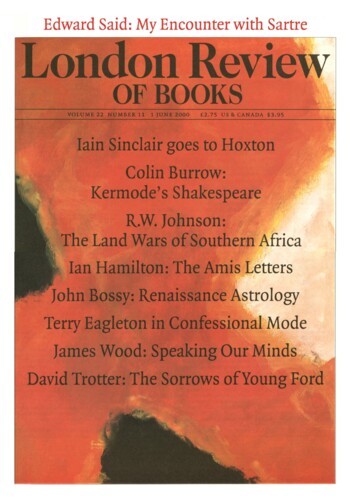Simon Anholt is a very successful advertising copywriter, ‘widely recognised as one of the world’s most influential and respected consultants to corporations seeking to market their brands in the global marketplace’. From a certain point of view, his new book, Another One Bites the Grass: Making Sense of International Advertising (Wiley, 326 pp., £19.50, 2 March 2000, 0 471 35488 0), does exactly what it says on the tin. It ‘offers practical, real-world advice on successful marketing to a foreign culture’ and there are plaudits on the back from people like the Global Media Director of Heinz, who says that Anholt’s ‘perspective’ is ‘inspiring’. In the book, Anholt tell us that ‘consumers are, alas, not stupid: they have uncannily sensitive cultural antennae, and can detect an ad which was never really meant for them in the first place from about a hundred yards downwind.’ When you get close enough to this book to read it, you can detect it’s meant for people like the Global Media Director of Heinz. Nonetheless, it has some curiosity value, even for a consumer for whom it was never really meant in the first place. Most remarkable is the perfect 180° spin it puts on the problems of globalisation. Anholt uses diction normally associated with anti-corporate rhetoric: he talks of ‘eye-opening disaster stories’ and threats to ‘integrity’. It just so happens that he has in mind the difficulty of ‘maintaining brand integrity’, and the so-called ‘disasters’ are ‘international marketing blunders’. Any suspicions that this might be devaluing the word ‘disaster’ are confirmed when you read the first such story in the opening chapter. An English airline offering cheap flights from Riyadh to London discovered that the man who’d translated the ad into Arabic had taken advantage of the opportunity to advertise his brother-in-law’s restaurant on the Edgware Road at the same time. Not so much a marketing disaster as a triumph, I’d say.
In its own, rather more modest way, the ‘long awaited motorists’ driving manual’ 1288 (BBS, 317 pp., £18.99, 3 May 2000, 1 903029 00 7) by Derek Bracegirdle subverts certain assumptions, too. (I don’t understand the title.) The book, ‘probably the most exciting, enthralling and entertaining driver’s compendium ever to reach the bookstand’, has been ‘compiled from almost 2000 facts for the Benefit of the Motorist who wishes to improve his or her technique, enjoy the road and “save a life”’. The quotation marks admit of some ambiguity, but it’s hard to see how not running people over is the same as saving a life. Why not ‘save two lives’, or even ‘six billion’?
Less likely than 1288 to save a casual pedestrian’s life, but more likely to give peace of mind to an ‘independent traveller’ subsisting on Heinz beans in the Far East, Rough Guides Ltd has brought out its own travel insurance, ‘priced competitively’ for their readers, who are ‘low-risk’ because ‘well-informed’. What subtler way to advertise their distinctive and reliable ‘global brand’? The announcement coincided with the publication of one of their latest titles, The Rough Guide to Techno (374 pp., £5.99, 28 April 2000, 1 85828 434 1) by Tim Barr, though I doubt they’ll insure you against buying dodgy pills in clubs. The thing about techno which makes it a bit like jazz is that if you’ve still got to ask, you ain’t never gonna know. I don’t see how pretending it’s a country in West Africa (or some virtual space in the ‘underground’ continent of Electronica) will help. Anyway, ‘this handy and eyecatching little book can be slipped into your pocket when you need your hands to do more important things – like spinning the decks.’ Cool.
The Public Record Office has published a 1946 account of the wartime activities of Juan Pujol, a Spaniard who worked for British Intelligence, codenamed after Greta. Garbo: The Spy who Saved D-Day (336 pp., £19.99, 25 May 2000, 1 873162 81 2) is the work of Tomás Harris, Pujol’s MI5 controller. Pujol was so keen to work against the Nazis that he started sending the Abwehr freelance disinformation from Lisbon even before the British recruited him. Eventually they agreed to take him on and he went to London in April 1942, from where – after a power-wrangle between SIS and MI5 over who’d get him – he set up a network of 28 fictional agents and lied to the Germans for two and a half years, crucially making them think that the main D-Day offensive would be aimed at the Pas de Calais. After the war he retired to Venezuela, where he died in 1988. I don’t know whether or not he was insured.
After the First World War, Siegfried Sassoon became literary editor of the Daily Herald. In the first piece he wrote for it, he said:
The life of a literary editor is like a fairytale. He gets up at a not unreasonable hour; on his way to work he pops in to see a few eminent and sympathetic publishers. Finally he drifts down Fleet Street like a ray of sunshine and arrives at the office, where he finds that people have sent him presents of lovely books. After glancing at a few of these, he writes some literary notes and goes away to spend his salary.
This may or may not be true.
Send Letters To:
The Editor
London Review of Books,
28 Little Russell Street
London, WC1A 2HN
letters@lrb.co.uk
Please include name, address, and a telephone number.

